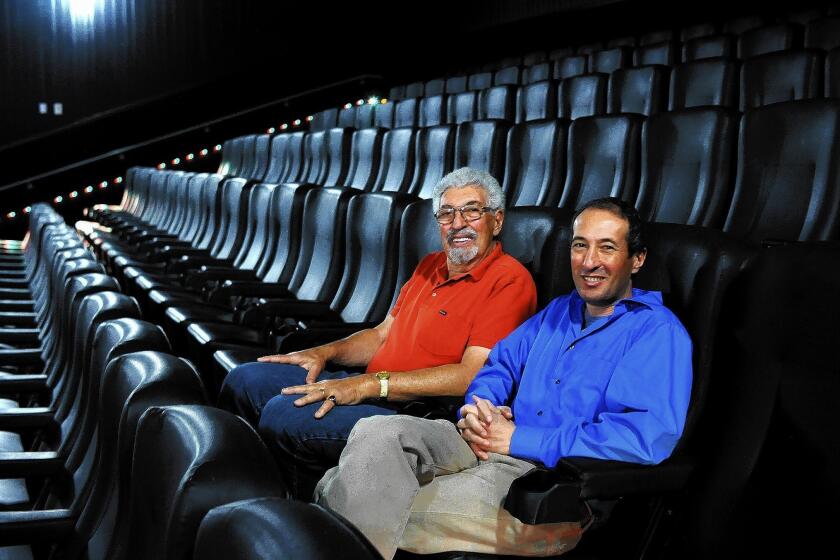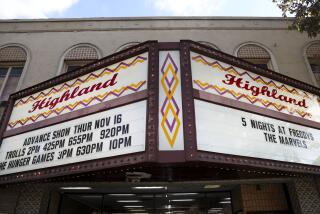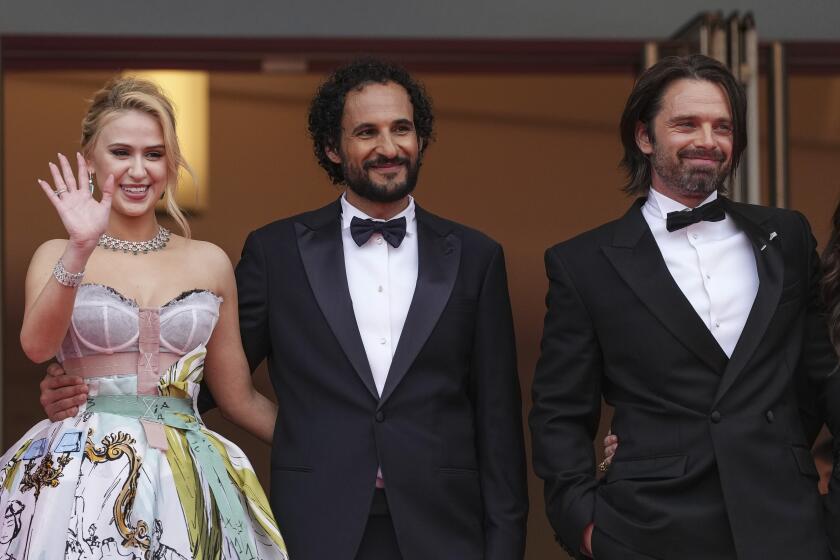Can neighborhood arthouse cinema survive in the age of Netflix?
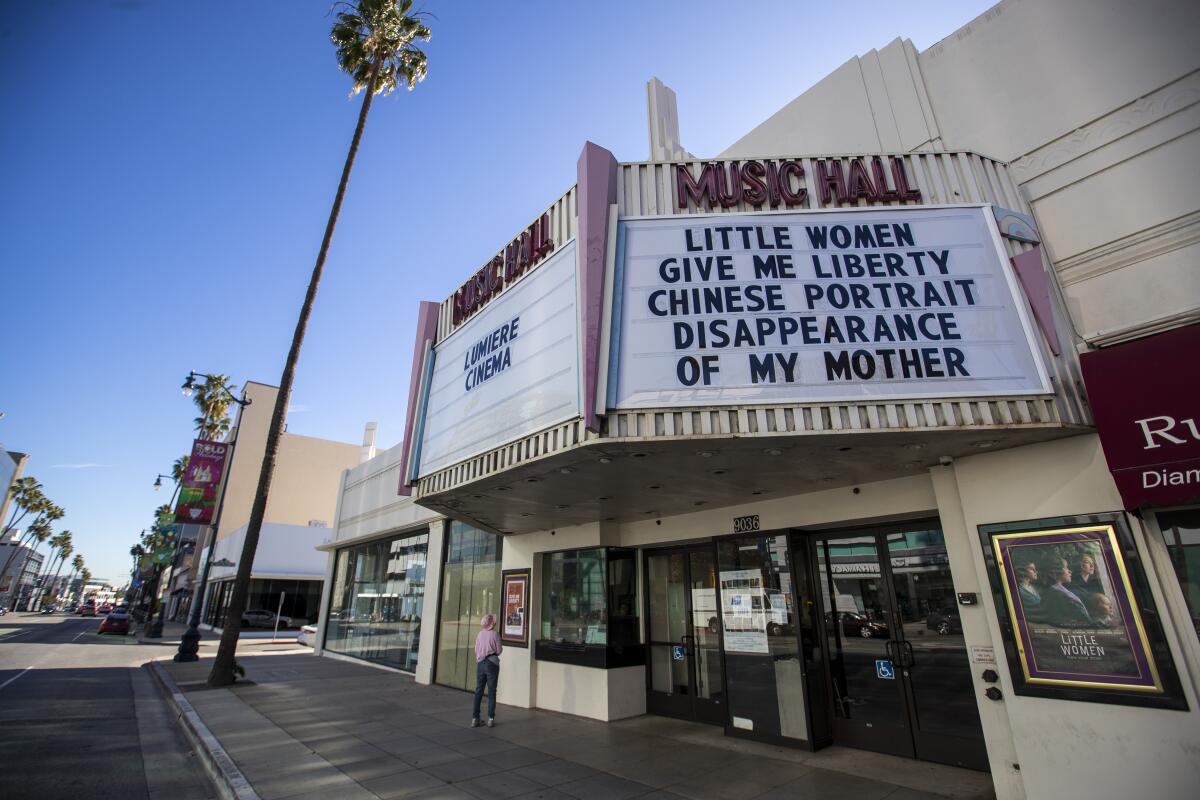
With movie ticket sales down approximately 4% from 2018, and the onslaught of Peak TV and the Netflixification of film viewing compounding the endangered species status of locally owned independent cinemas, it’s not often that you see a shuttered movie house reopen — much less in a week’s time.
But that’s what happened at the Music Hall in Beverly Hills, which was operated by L.A.’s arthouse stalwart Laemmle Theatres from 1974 until it screened its last film there in late November. (A plan to sell the chain altogether also was laid to rest that month.)
Yet the following Friday, the theater, rechristened Lumiere Cinema at the Music Hall, was back in action under the aegis of a group of two former and one current Laemmle employees and showing such films as Pedro Almóvodar’s acclaimed “Pain and Glory.” Movie joy reigned again on that busy stretch of Wilshire Boulevard just east of Doheny.
The Art Deco-style Music Hall has been a significant part of Los Angeles’ film history for 82 years. It opened in 1937 as the Elite Theatre and, in 1945, was renamed the Music Hall. From 1950-56, it functioned as a TV studio but was reopened as a movie theater in 1956 — and renovated in 1960 — by the Walter Reade Organization.
During the 1960s, the Music Hall saw the debuts of such major foreign films as “La Dolce Vita,” “Juliet of the Spirits” and the Russian-produced version of “War and Peace.” In the mid-1990s, Laemmle subdivided the then-single-screen, 824-seat house into three auditoriums with a combined seating of 509.
The new Lumiere was the brainchild of Peter Ambrosio, Lauren Brown and Luis Orellana, longtime Laemmle staffers, film fans and self-described “Los Angeles ‘film people,’ ” who had worked together at the Music Hall for five years. The idea was hatched last summer when they started hearing rumors that the venue might be closing.
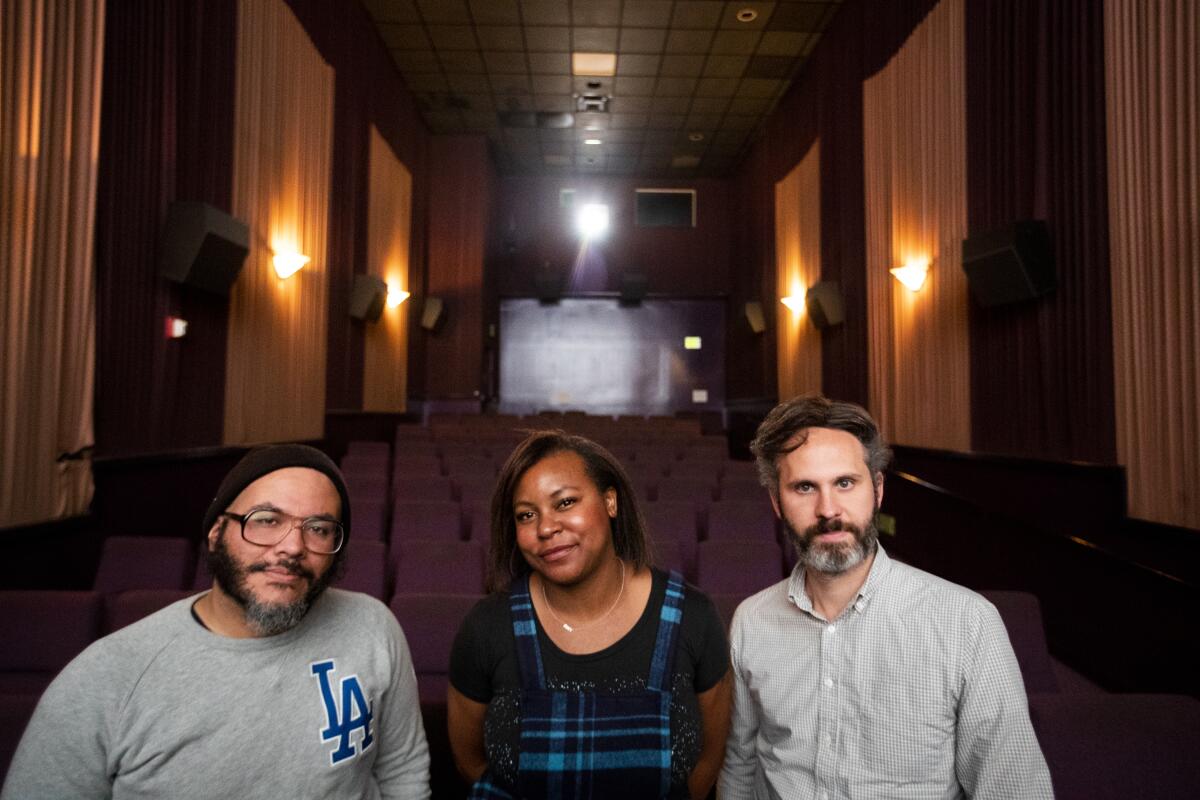
“I became adamant that we should try to own our own theater,” said Ambrosio by phone recently from his New Jersey hometown, where he was spending the Christmas holiday. “The question was how?”
But after looking at several already dormant local movie houses, Ambrosio, Brown and Orellana set their sights back on the Music Hall and had positive meetings with both Laemmle Theatres President Greg Laemmle and the building’s landlord to discuss a possible handoff.
The Los Angeles-based theater chain will remain family owned. But Thursday is the last day of business for the company’s Music Hall location in Beverly Hills.
Timing was on Ambrosio and company’s side: They could satisfy the landlord’s need for immediate tenancy plus jump in as a buyer for the cinema’s full range of theatrical equipment, which was owned by Laemmle. A deal was struck, and Lumiere signed a one-year lease on the property with four renewal options.
“We got in at a very low capital investment,” said Ambrosio, an indie filmmaker whose second feature, “Sunday Girl,” played the Music Hall in mid-November. “We certainly very much appreciate what they [Laemmle] did. They basically said, ‘We’ll make it very easy for you to have this theater up and running very quickly.’ ” The Lumiere trio is financing the venture through a combination of personal and family money.
But awareness about the cinema’s rebirth hasn’t happened overnight. “I’m still having issues with people thinking the theater is closed,” said 30-year Hollywood resident Orellana, who sat for a chat with Brown in the coziest of the Music Hall’s auditoriums as Ambrosio weighed in via speakerphone. “Though for me, what’s more important than anything right now is that we’ve gotten some of our regulars back.”
The team has made some initial improvements on the theater, most notably installing a spanking new, lettered marquee; the old one had fallen into disrepair several years ago and was simply left draped with generic Laemmle banners.
“Right now, I think there’s this interesting dichotomy where people are attracted to ‘the new,’ but there’s also this big push for ‘the old’: like the revival of 35mm [film] after it seemed like nobody cared,” said Ambrosio. “I think the marquee is part of that for us. It’s an ‘old school’ thing that people really appreciate.”
Added Orellana, “People said they used to know what was playing here because of the marquee. Now, they do again.”
They also repainted the lobby and removed some of its older fixtures to make for more open space, a “welcoming” feature they hope to expand on.
“We also plan to paint the stairwells and second floor, play up more on the Art Deco style, redo the carpets and maybe even redo some of the curtains in the auditoriums,” said Brown, a Beverly Hills native who has worked for Laemmle Theatres since 2001 when she was in high school. (She still serves as general manager of the circuit’s Royal Theatre in West L.A., in addition to her Lumiere duties.)
A beer and wine license is also on the horizon, as is an expansion of concession stand snack fare. The theater’s 35mm projector is being reinstated as well.
Ticket prices have remained largely the same as Laemmle’s fees, including bargain rates for weekday showings until 6 p.m. as well as senior and student discounts.
But the key, as with any theater, is getting folks to show up. To paraphrase Sen. Elizabeth Warren, the Music Hall team has a plan for that. Several, actually.
“Going forward, a big part of our strategy is the fact that we have three screens,” said Ambrosio. “We plan on leaning into that and being a very unique hybrid. We can go in every direction at once almost: first-runs, moveovers [transfers from other theaters], four-walls [theater rentals] and repertory.”
He added, “The strategy is to program the theater in a way that we’re satisfied with, not in a way that fulfills a particular slot. Our sense of experimentation is going to lead us into places that [will allow us] to see what works and what doesn’t.”
Further new ideas include attracting film students from UCLA and other nearby campuses to see the modern classics on the big screen in 35mm, showing movies that serve a particular immigrant or expat community (“The Persian films that play at the Music Hall do huge business,” Ambrosio noted), and reviving or maintaining popular legacy film series.
Brown also confirmed the theater’s commitment to promoting diverse voices. “We want to have a more cultural movie presence than there is right now, so starting in February we are going to showcase Native American films at least once a month,” she said. “I’m also going to reach out to [filmmaker and inclusion advocate] Ava DuVernay, see if we can get something working with her.”
As for those crucial first-run engagements, Lumiere will compete to show the kind of elevated, critically supported indie, international and documentary films that can bring a theater both cachet and those coveted specialized audiences. And if a buzzier new movie can premiere exclusively at the Music Hall, as was recently the case with the highly praised documentary “Chinese Portrait,” so much the better.
Orellana takes the lead on these bookings, citing the long-term relationships he established with many distributors while managing theaters for Laemmle as a helpful leg-up in programming the Lumiere. “But it’s also essential for us to start new relationships,” Orellana said, “not just for now, but for the future — [for everyone] to keep us in mind.”
At the same time, a push is being made to bring first-run, general-release studio features, such as the current “Little Women,” into the mix. But the co-owners say they’ll be as strategic about these bookings as they would any film. “What makes a ‘Little Women’ different is that it’s a big-budget film but it’s also a little more indie. It’s Greta Gerwig,” said Brown. “But something like a ‘Star Wars’ [film] would not be on our radar.
“We have the ability to be more picky and choosy about what kind of first-run movies we take in,” she added.
Ultimately, Ambrosio, Brown and Orellana are nothing if not optimistic. “Once we build our reputation, it’ll be people saying ‘Let me see what’s playing there’ as opposed to ‘Let’s see where the movie I want to see is playing,’ ” said Ambrosio. “I think that’s something we’re trying to get to as fast as we can.”
More to Read
Only good movies
Get the Indie Focus newsletter, Mark Olsen's weekly guide to the world of cinema.
You may occasionally receive promotional content from the Los Angeles Times.
